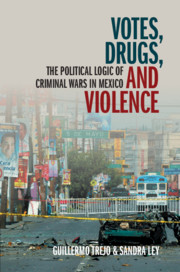Book contents
- Votes, Drugs, and Violence
- Cambridge Studies in Comparative Politics
- Votes, Drugs, and Violence
- Copyright page
- Contents
- Figures
- Maps
- Tables
- Preface
- Acronyms
- Introduction
- Part I A Political Theory of Criminal Violence
- Part II The Outbreak of Inter-Cartel Wars
- Part III The State’s War Against the Cartels
- Part IV The Rise of Criminal Governance: Subverting Local Democracy in War
- 6 Why Cartels Murder Mayors and Local Party Candidates
- 7 Seizing Local Power
- Conclusion
- Appendix A Criminal Violence in Mexico Database (CVM)
- Appendix B Criminal Attacks Against Political Actors in Mexico (CAPAM) Database
- Appendix C Chapter 2. Multivariate Regression Models (Robustness Checks)
- Appendix D Chapter 4. Multivariate Regression Models (Robustness Checks)
- Appendix E Chapter 4. Natural Experiment (Additional Information)
- Appendix F Chapter 6. Multivariate Regression Models (Robustness Checks)
- Appendix G Chapter 6. Natural Experiments (Additional Information)
- References
- Index
- Other Books in the Series (continued from page iii)
6 - Why Cartels Murder Mayors and Local Party Candidates
Subnational Political Vulnerability and Political Opportunities to Become Local Rulers
from Part IV - The Rise of Criminal Governance: Subverting Local Democracy in War
Published online by Cambridge University Press: 16 September 2020
- Votes, Drugs, and Violence
- Cambridge Studies in Comparative Politics
- Votes, Drugs, and Violence
- Copyright page
- Contents
- Figures
- Maps
- Tables
- Preface
- Acronyms
- Introduction
- Part I A Political Theory of Criminal Violence
- Part II The Outbreak of Inter-Cartel Wars
- Part III The State’s War Against the Cartels
- Part IV The Rise of Criminal Governance: Subverting Local Democracy in War
- 6 Why Cartels Murder Mayors and Local Party Candidates
- 7 Seizing Local Power
- Conclusion
- Appendix A Criminal Violence in Mexico Database (CVM)
- Appendix B Criminal Attacks Against Political Actors in Mexico (CAPAM) Database
- Appendix C Chapter 2. Multivariate Regression Models (Robustness Checks)
- Appendix D Chapter 4. Multivariate Regression Models (Robustness Checks)
- Appendix E Chapter 4. Natural Experiment (Additional Information)
- Appendix F Chapter 6. Multivariate Regression Models (Robustness Checks)
- Appendix G Chapter 6. Natural Experiments (Additional Information)
- References
- Index
- Other Books in the Series (continued from page iii)
Summary
This chapter analyzes a surprising wave of 311 lethal attacks by drug cartels against local elected officials and party candidates in Mexico (2007–2012). As the War on Drugs intensified, competition for turf increased and drug lords expanded their range of actions into new illicit markets – including extortion, kidnapping, and the extraction of natural resources. Cartels attacked mayors and local party candidates to develop subnational governance regimes as part of their new strategy. We use time-series cross-sectional analyses to show that attacks took place in subnational regions where intergovernmental partisan conflict between Right and Left was more intense and mayors and local party candidates were unprotected and vulnerable. Attacks took place disproportionately during subnational election cycles, when new governments were elected and new appointments were made. Two natural experiments, contrasting municipalities along the Michoacán–Guerrero and Michoacán–Guanajuato borders, show that political vulnerability and political opportunity are causally related to the probability of attacks against mayors and party candidates.
Keywords
- Type
- Chapter
- Information
- Votes, Drugs, and ViolenceThe Political Logic of Criminal Wars in Mexico, pp. 215 - 251Publisher: Cambridge University PressPrint publication year: 2020

